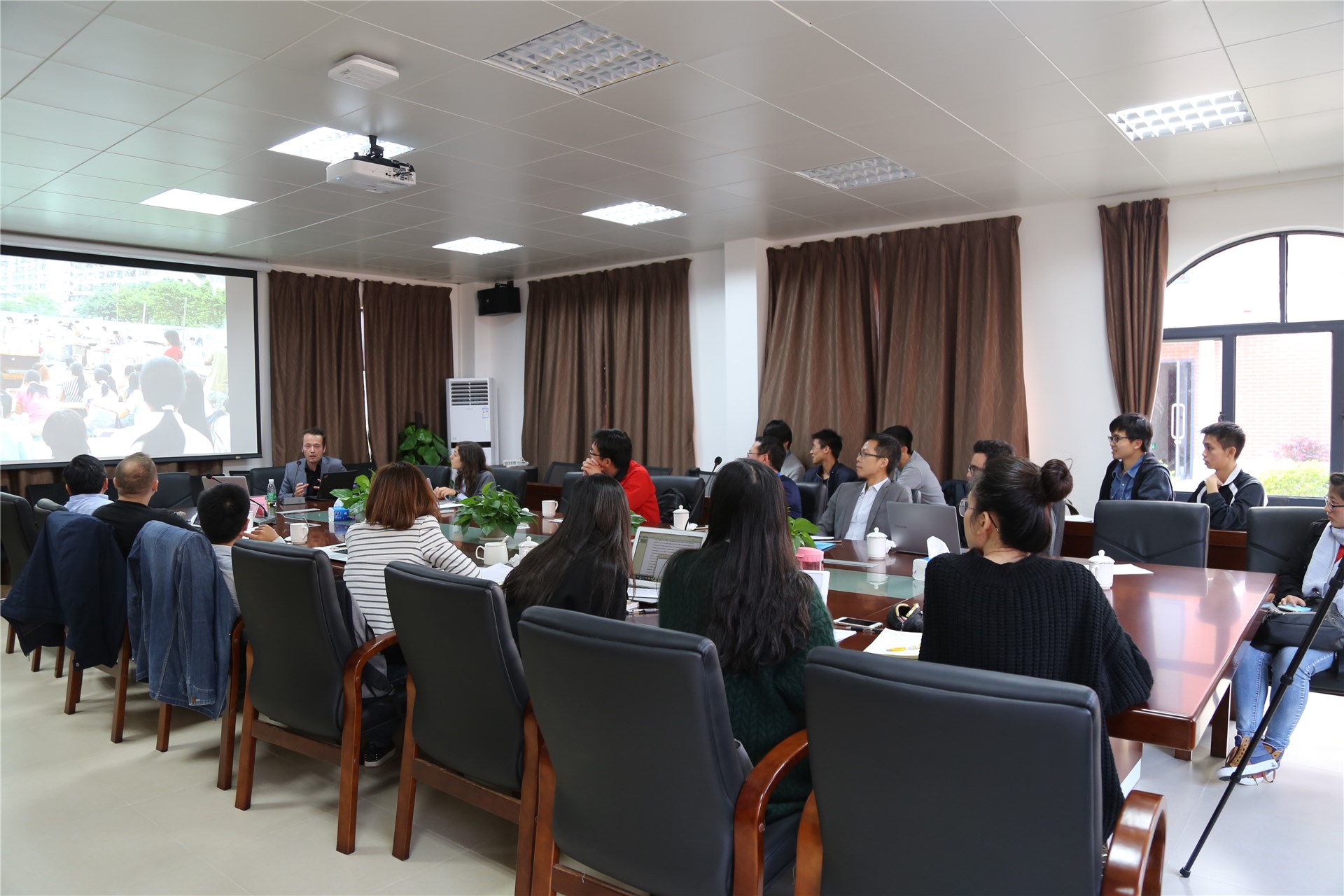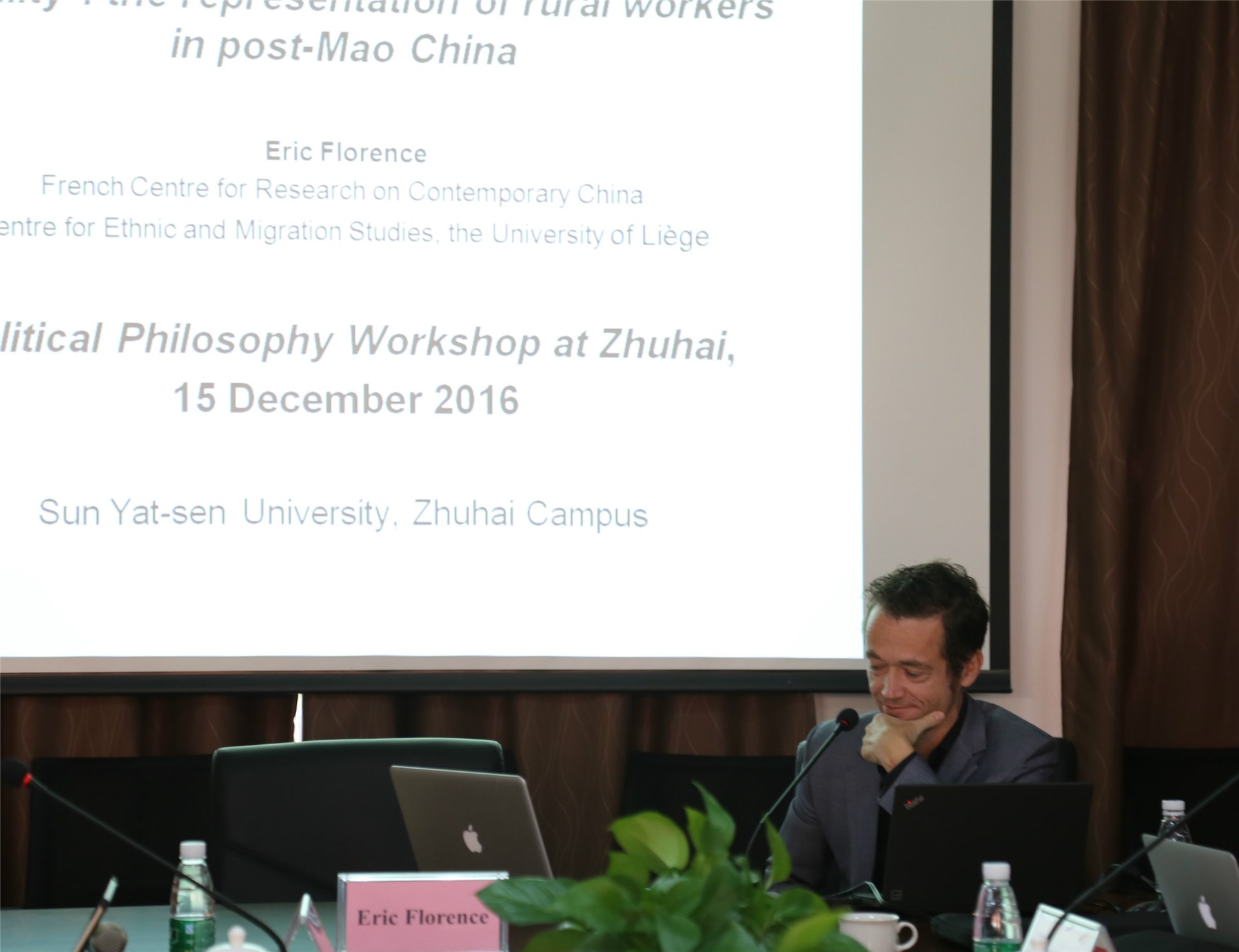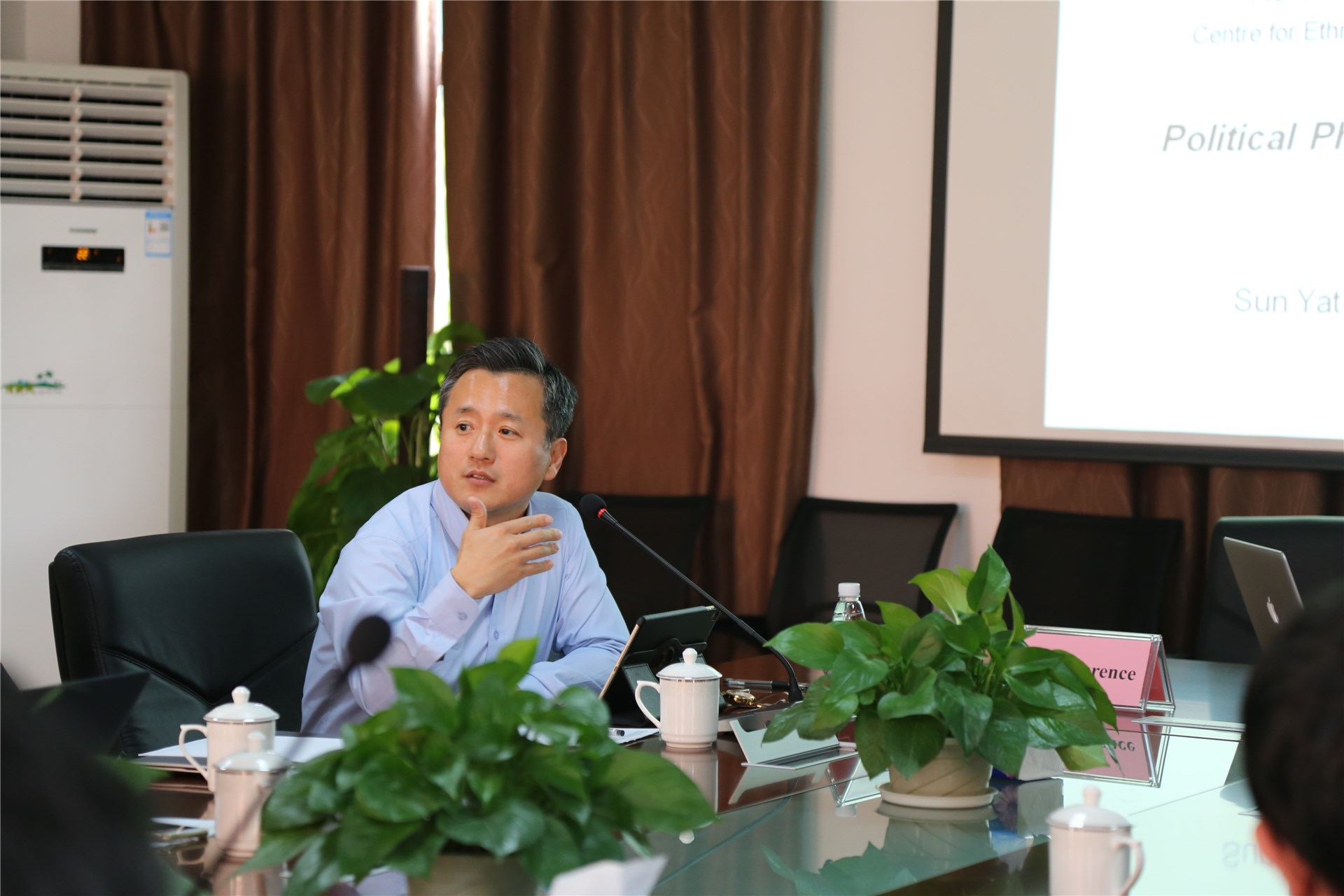Political Philosophy Workshop第四讲:公共空间、调解和受关注度

Political Philosophy Workshop第四讲:公共空间、调解和受关注度
12月15日下午,中山大学哲学系(珠海)Political Philosophy Workshop第四讲,在海滨红楼13栋哲学系(珠海)办公楼106会议室顺利举行。
本次工作坊主题为Public Spaces, Mediation and Scales of Visibility,由我系郭峻赫教授(Jun-Hyeok Kwak)主持,主讲人为来自比利时列日大学的Eric Florence教授,他目前是法国现代中国研究中心(CEFC)(香港)研究员,兼任比利时列日大学种族和移民研究中心副教授。

Florence教授的讲座关注的是现当今中国的农民工迁移之后带来的代表和身份认同问题。Florence 副教授就自己多年来对中国打工者群体的研究做了相关报告,基于与打工者群体的广泛接触和深入调查,Florence教授尝试将阿伦特和福柯等人的政治哲学理论引入到对该问题的探讨,具体分析了调解(mediation)和受关注度(visibility)的概念,并将这个概念和代表(representation)观念结合了起来。随后,Florence教授介绍了现当今中国农民工的媒体代表所具有的历史特征。最后,Florence教授展示了通过所谓的草根组织如何能让这一代表观念具有实际的可操作性。
随后,由Judith Audin对其论文中涉及的相关问题进行总结并提出问题,Audin依据自己多年在中国乡村田野调查的经验提出了独到的而又有意义的见解。我系研究员Dr.Beaumont,Dr.Roderigues和罗志达博士和学生们也纷纷加入讨论当中,就Florence副教授的论文以及当下国内打工者现状与未来和中国社会现状发表了各自的意见。
研讨会的最后,郭峻赫教授对Florence教授的讲座内容进行了总结,并表示期待看到Florence教授关于具体案例讨论的更多细节和论证。同时,郭教授对Florence的演讲和对哲学系(珠海)的支持表示了感谢。

Political Philosophy Workshop (Ⅳ):Public spaces, mediation and scales of visibility
For this session of the Political Philosophy Worskhop in Zhuhai, Professor Éric Florence from the University of Liège, a specialist of the cultural politics of Chinese migrant workers in the postsocialist era, gave a presentation on “public spaces, mediation and scales of visibility in the case of representation of rural workers in post-Mao China”. Professor Jun-Hyeok Kwak introduced the workshop by reminding the audience that political representation is an important field of political philosophy. More precisely, political representation can be understood in terms of speaking for, voicing from the bottom into politics, speaking for the people and therefore, the issue of representation is often linked to the one of mediation.
Professor Florence adopted a constructivist approach to analyze the politics representation and mediation of migrant workers in China. He first shed light on several concepts such as representation, mediation, and “arrangements of mediations”, that is to say “hybrids of people, techniques and organizations”. He especially raised the issue of representation at the grassroots, quoting Susan Bleil on the landless peasants in Brazil. The issue of representation is about scales of mediation and vizibilization of the people, allowing them operations of framing, and voicing of their claims. In the case of migrant workers in China, it is an important aspect in the voicing of issues: the hukou, the right to education, for example, were written on the political agenda in the end. Indeed this presentation gave a new perspective on migrant workers in Chinese society. Instead of seeing migrant workers as a dominated static group, Professor Florence discussed their evolving representation modes through the concepts of “agency”, “subjectivity” and “hegemony”. Practical arrangements with the daily worlds are linked to historically produced institutional and structural settings. Hegemony can thus be understood as a process (Williams), as a lived experience (Gramsci), and as an unstable process. For example, to enhance « realize oneself » was a desire of migrant workers, a very ideological category but which is narrated in a whole different and specific context in interviews of each person. This is a form of “inclusive representation” or “representation by subjectivization” (S. Hayat).
In the second part of the talk, Professor Florence gave more precise examples from his research on the evolving representation of migrants. In the early representation (1980s-1990s), they were seen as nongmingong, demonized, at a time when there were just very few channels of representation for migrants, and only marginal debates in the official press about them as agents of economic transformations. Migration was understood in terms of disorder, instability, and invasion. The representation evolved, from nongmingong to dagongzhe, when the official representation in the Chinese media turned from masses to people. The channels of expression also changed. He gave an example of a letter, showing how popular personal testimonies became. That is how migrants participated in the construction of a certain visible identity, thanks to the emergence of new narrative modes about their determination, aspirations, the embodied indignity as a form criticism, and rightful resistance and extension (mediation channels). In a way, the representation turned from hooligans to models. Finally, he mentioned the new part of his research about the representation of migrant workers in popular culture, using literature, TV shows and films.
In the role of respondant, Judith Audin explained that it was an interesting contribution to the study of the evolving representations of migrant workers in China under the angle of “mediatic representation”. Éric Florence showed the evolving representations of migrant workers in China through the configurations of mediation, as new narratives and forms of expression emerge and challenge the former representation of migrants. He shows that migrant workers, by their experiences and desires, contributed to producing these representations in more local forms of socialization. This conceptualization of representation in China sheds light on the dynamic movements and interactions around processes of « identities made visible », which gave way to new forms of socialization and mobilization of vulnerable groups in China. Mediation through official channels of expression can actually be used for social change. The historical sociology of these mediatic representations is a very good choice to better understand the evolution of social representations throughout time. Finally, on the methodology of the research, it is very inspiring that Eric Florence decided to analyze together the mediatic discourse, and the more concrete social behaviors of migrant workers. Using together media studies and ethnography is a very difficult exercise, but Éric Florence managed to draw some links between the unifying, dominant mediatic representation produced and made visible on the media in China, and the more concrete, more micro-localized forms of identity production by migrant workers themselves. Finally, Judith Audin questioned Eric Florence on the specific field of the “media” in China, on references to Foucault and subject making, and on a potential comparison with Isabelle Thireau’s work on the Letters and Visit administration in China, and the creation of a space of dialogue thanks to the narration of experiences by ordinary people.
This fascinating issue of the representation of migrants understood through subject making raised very interesting further discussion with the audience. Not only was the theoretical framework discussed about the issue of domination and resistance (Foucault, Gramsci, Scott), but also questions about the social condition of migrants in China (reform of the hukou system in different urban contexts) and Europe (border opening/closing in the European Union) were asked. More conceptual issues were debated around the notion of visibility and about the Chinese temporality of modernity. Therefore, this seminar about the dynamics between constraints and agency of rural migrants in China was a way to rethink the issue of representation and social change in the Chinese political system but to ask more general questions about the experience of migration, the social integration, and the political representation of migrants as very complex issues in the world.


